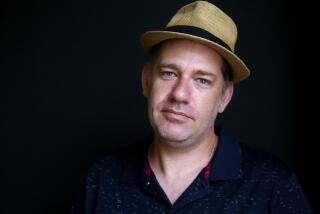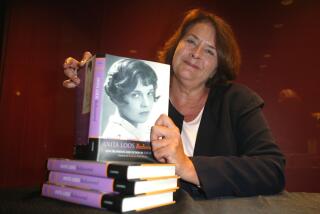Dentist Made It in Real Estate With Lots of Practice
When the Newport Harbor tour boat guide tells his passengers ogling the posh waterfront homes that “the man with the large green lawn is the friendly credit dentist,” the owner of the property, Dr. Robert F. Beauchamp, cringes.
Although for almost half a century Beauchamp has advertised vigorously to make his name--and therefore the name of his eight clinics--well known in Southern California, he is a very retiring man who tries to keep his life and business affairs private.
In the 1940s and 1950s, Beauchamp built a reputation as a maverick dentist. His advertising was frowned on as unprofessional by his peers but attracted droves of patients to his doors. He created a profitable practice by serving lower-income, minority communities whose dental needs were largely going unmet. At a time when dental insurance was unheard of, he made dental care affordable to his patients by letting them pay their bills on installment without charging interest.
Today Beauchamp’s dental offices are only a small part of a family empire of financial enterprises, primarily real-estate related, over which Robert Beauchamp, now a spry 71, presides as patriarch.
Housed on the seventh floor of a high-rise office building on MacArthur Boulevard in Newport Beach, Beauchamp Enterprises consists of a loose network of 30 to 40 different partnerships, sole proprietorships and corporations in which Robert Beauchamp and one or more of his close relatives and business associates participate. Members of the Beauchamp clan active in the various enterprises include his three sons, two sons-in-law and a nephew. Even the receptionist is a cousin.
The Beauchamp family’s real estate holdings have grown steadily over the years and include 12 apartment projects totaling 3,000 units in Orange County, San Diego, Phoenix, Riverside and Hemet, as well as three marinas in Ventura, San Diego and Los Angeles counties and a scattering of office buildings and shopping centers.
Robert Ganiere, a longtime Beauchamp employee and financial controller, estimated that the Beauchamp family has about $100 million equity in $500 million worth of real estate assets.
Beauchamp’s current endeavors range from developing a 43-acre industrial park in Corona and an 81-home subdivision in Sunnymead to acquiring $20 million worth of mini-storage properties in Santa Fe Springs, Modesto and Salinas.
But the most ambitious project of his to date is the 17-story Alicante Princess hotel and an adjoining 10-story office tower nearing completion on 17.7 acres at the corner of Harbor Boulevard and Chapman Avenue in Garden Grove. The two buildings--an $88-million undertaking--are connected by a 160-foot-tall glass atrium and surrounded by palm trees and fountains, with giant statues of flamingos in front.
Beauchamp recently consented only reluctantly to be interviewed, with the goal of helping to promote the project.
Beauchamp said he will seek city approval to build additional office buildings and perhaps another hotel next to this “first phase” development. When completed, Alicante Plaza, as the Beauchamps have named the project, would cover 40 acres within Garden Grove’s redevelopment district and constitute an estimated $300-million investment.
‘Downhill Skid’
The medical maverick may also be preparing to break new ground in his dental business. Beauchamp said that his eight dental offices “are on a downhill skid,” with volume declining steadily since 1983, and that he is ready to once again move on the offensive.
Reluctant to disclose his strategy to competitors, Beauchamp acknowledged only that his organization is “studying” the possibility of establishing a health plan or franchise of its own.
Still, according to the state Department of Corporations, a dental health plan called Western Dental Services Inc. recently formed with the same headquarters as Beauchamp Enterprises. The company is wholly owned by Ganiere, Beauchamp’s controller and frequent business partner. Several weeks ago Western Dental Services Inc. opened its first office in Santa Ana. Beauchamp officials declined to discuss his association with the new venture.
Although Beauchamp still keeps close tabs on his dental business and takes courses to keep his dental license current, he has not actually practiced as a “wet finger dentist” since 1964, when he decided to devote most of his time to real estate investing.
Seldom mentioned in society columns, Beauchamp spends most of his free time with his family, visiting his weekend retreat near Palm Springs or playing doubles at a tennis club he has built behind the Balboa Peninsula home where he and his wife have lived for the past 25 years. He is a man who treasures informality--never wearing a business jacket or tie to the office--and he sports a droll, understated sense of humor.
Beauchamp remembers without any trace of bitterness that only a decade ago he was barred from joining the California Dental Assn. because he advertised his services. “They (mainline dentists) used to hate me,” he said matter-of-factly.
Attitude Changing
Beauchamp’s son Dick said he changed his mind about pursuing a dental career in his father’s footsteps partly because he believed that prejudice against the Beauchamp name might make it impossible for him to obtain a license to practice in California.
But in recent years the general attitude of dentists regarding the ethics of advertising has relaxed, prompted by a 1977 U.S. Supreme Court decision upholding the legality of advertising by professionals. Beauchamp said that although today he would not be barred from joining the California Dental Assn. and many Beauchamp-employed dentists are CDA members, for his part he sees no reason to join the group.
Beauchamp continues to advertise his dental services heavily, focusing on ethnic television and radio stations. He is no longer an oddity as one of a very few advertising dentists. Moreover, he points out that in recent years a surge of competition from other advertising dentists and dental clinics has begun to grab away some of his dental business.
Beauchamp refuses to disclose his net worth or the revenues of his various enterprises, though he insists that the income he receives from his dental offices is “no big thing,” especially in comparison to the income derived from his myriad of real estate investments.
But the dentist’s financial substance is no secret to brokers and entrepreneurs, who stream through the Beauchamp offices, their briefcases bursting with proposals. Although staff and family members review the proposals and make recommendations, the elder Beauchamp, described by those inside and outside his organization as a shrewd businessman, makes the final decisions.
“All of us feel we work directly for my dad,” said Dick Beauchamp, the dentist’s 42-year old son, an avid surfer and diver who divides his time between traveling in search of challenging waves and heading the company that manages the Beauchamps’ properties.
Other Relatives in Business
Other relatives involved in property management, development or acquisition are Robert Beauchamp’s sons Robert Jr., 45, and David, 38, and his two sons-in-law, John A. Grimstad, 41, and William H. Riechers, 34. His brother Jim, 57, has worked with him for 39 years and manages his dental offices.
Until recently, the elder Beauchamp’s business role was primarily as a silent real estate investor. He provided builders with cash and/or a financial statement that carried weight with lenders.
Mark Van Ness, regional manager for the Orange County office of Marcus & Millichap Inc., an investment brokerage, described Beauchamp as “a heavy hitter” who can successfully compete for investment properties against private syndicators and institutional buyers like savings and loans by moving more quickly to make an offer or close a deal.
In the course of his eclectic career in real estate, Beauchamp once was a substantial shareholder and director of Standard-Pacific Corp., a major Costa Mesa home-building company, and from 1970 to 1981 he and his son Dick owned 50% of the stock of Warmington Development Inc., another sizable home builder based in Irvine.
Among his other far-ranging activities, Beauchamp at one time or another has owned race horses, a travel agency, 17,000 acres of farmland in the Imperial Valley and a controlling interest in British Midland Airways, a private airline in Great Britain. In the 1950s, he acquired a partnership interest in thousands of acres in San Diego County, part of which was sold to the La Costa Land Co. for the now-famous hotel resort.
‘We Never Sell’
But Beauchamp has benefited mostly by simply hanging on to his apartments and commercial real estate properties, which skyrocketed in value during the inflation of the last two decades. “We never sell,” he said bluntly.
And so far Beauchamp’s investments--whether they succeeded or failed--have attracted little public notice. “Dr. Beauchamp doesn’t like to talk about his financial affairs,” Ganiere said.
However, the Beauchamps’ showpiece project, the Alicante hotel and office complex, may change all that. Not only is it the most visible project but, some real estate professionals said, it also poses considerable risk for Beauchamp.
Al Gobar, a Brea real estate consultant, said his own market studies of the Alicante Plaza conclude that it suffers in comparison with the many other luxury office complexes under construction in Orange County. “I think it is a tough spot to build office buildings,” Gobar said, criticizing the Beauchamp project’s remoteness from freeways and Garden Grove’s lackluster business address. Moreover, he predicted that the Beauchamps’ first office tower will have difficulty filling up partly because the entire office market has been softened by overbuilding.
Still, Beauchamp says of the development, “It’s going to be . . . something absolutely out of this world.”
Beauchamp is no stranger to business risks. He and his family lost $10 million from their investments in the J. David & Co. investment firm of San Diego, according to Joe Cotchett, Beauchamp’s lawyer. The J. David firm, which purported to trade foreign currencies and return 40% to 50% annually to its investors, collapsed in a bankruptcy proceeding early last year and its founder, J. David Dominelli, is serving a 20-year sentence in federal prison after pleading guilty to three counts of fraud and one count of income tax evasion.
Named in Suit
The State of California is suing Beauchamp and other directors of Independent Indemnity Co., an Orange automobile insurance company, for investing--and losing--$1.7 million of the insurance company’s funds in the J. David scam. Early last year the state insurance commissioner took over the insolvent insurance company and sold off its assets.
Beauchamp also was a casualty in the 1981-82 bust of Southern California’s previously madcap real estate market. The sudden downturn caught Warmington Development with a surfeit of undeveloped lots and houses it could not sell and high-interest bank loans it could not afford to repay.
Ultimately, Beauchamp dug deep into his pockets to help settle the home-building company’s bank debts. As part of the settlement, he forfeited all 345,000 shares of stock he owned in Standard-Pacific Corp., which today would be worth about $9 million.
Leighton Tuck Sr., senior vice president of the Los Angeles loan department at First Interstate Bank, one of five banks with which the Warmington Development company settled, said Beauchamp and Warmington were more conscientious than most other builders in the same predicament.
Beauchamp’s experience with Warmington Development changed his approach to business deals, according to his staff members. They say that now, in any real estate venture with outside partners, Beauchamp arranges to be the majority owner so he can exercise management control.
Changes also are in the wind for Beauchamp’s dental business, which is feeling pressure from increased competition in the dental industry.
Took Advantage of New Law
For many years Beauchamp had an edge on most other dentists because of a grandfathering clause in a state statute.
Beauchamp recalled that in 1939, when he took over his father’s struggling, single-office dental practice in downtown Los Angeles, state legislation was enacted to go into effect the next January. He said the statute sought to prohibit any dentist from maintaining more than two full-time offices by requiring him to spend at least 50% of his time at each of them.
Aware of the pending restriction--and of a grandfathering clause that exempted dentists who acquired multiple offices before the law’s effective date--Beauchamp said he obtained funds from a friend to open seven more dental offices before the end of the year. “And it’s too bad I didn’t go for 20 (offices),” he said in retrospect.
After the dental office limitation went into effect, Beauchamp was among only a handful of California dentists with multiple offices.
Beauchamp candidly said that he wanted a chain of dental offices primarily to improve his earnings. As a young dental school graduate from the University of Oregon, he took note of how Dr. Faulkner Campbell, an advertising dentist with numerous offices, had fared much better financially than sole practitioners who simply hung out a shingle.
Used Others’ Ideas
Beauchamp modestly contends that he built his practice on the ideas of others. He said that his father before him had begun to advertise and to offer patients credit. He remembered with a chuckle that the morning after his father first ran an ad in a newspaper, he arrived at his office and found “there were so many people in there, it frightened him so badly, he turned around and left.”
Beauchamp said it was mostly by chance also that he developed a dental practice aimed at a low-income, minority clientele. He said that when he began his practice at 5th and Main streets in downtown Los Angeles, most private dental offices would not treat black people for fear that their white patients would be offended and take their business elsewhere. So black people with dental problems would have to go to the Los Angeles County Hospital’s outpatient clinic.
Beauchamp said he began to provide emergency dental care to blacks on Saturdays when the county outpatient clinic was closed. Gradually he also handled their dental problems other days of the week. “It wasn’t very long before (black patients) was all I had,” he said.
Later Beauchamp ran into difficulty with the state Board of Dental Examiners, which in 1978 temporarily suspended his license, then stayed the suspension when he agreed to stop setting up turn-key dental practices for young dentists through a dental finance corporation.
Denies Allegation
Beauchamp denies the state’s contention that the dental finance corporation was illegally practicing dentistry without a license. The corporation, he said, leased offices to new dentists, provided them with management advice and assistance and lent them start-up funds for the first year. If a dentist defaulted on a loan, the corporation would take possession of his office and patient charts.
Until the state suspension, Beauchamp said, his finance corporation assisted many young dentists who otherwise probably would not have found financing to start their practices. In all, he set up 20 offices for other dentists in return for a percentage of their gross. “We made 20 young dentists the richest young dentists that you ever saw,” he said.
Beauchamp’s brother Jim attributes Beauchamp’s financial success in dentistry and real estate in large measure to hard work. In the early years of Beauchamp’s dental practice “he would work from 9 in the morning to 9 at night,” his brother said, adding: “He still works very hard--why, I don’t know.”
More to Read
Inside the business of entertainment
The Wide Shot brings you news, analysis and insights on everything from streaming wars to production — and what it all means for the future.
You may occasionally receive promotional content from the Los Angeles Times.










